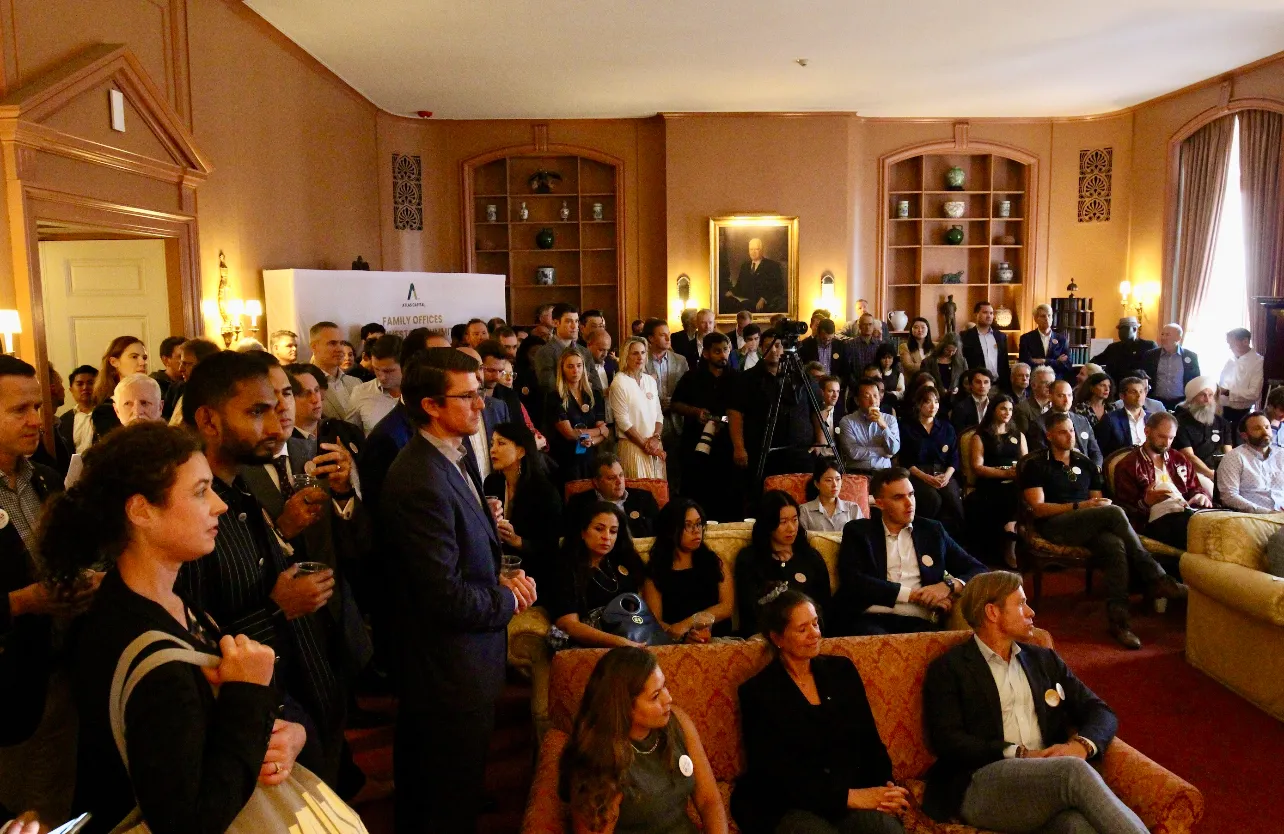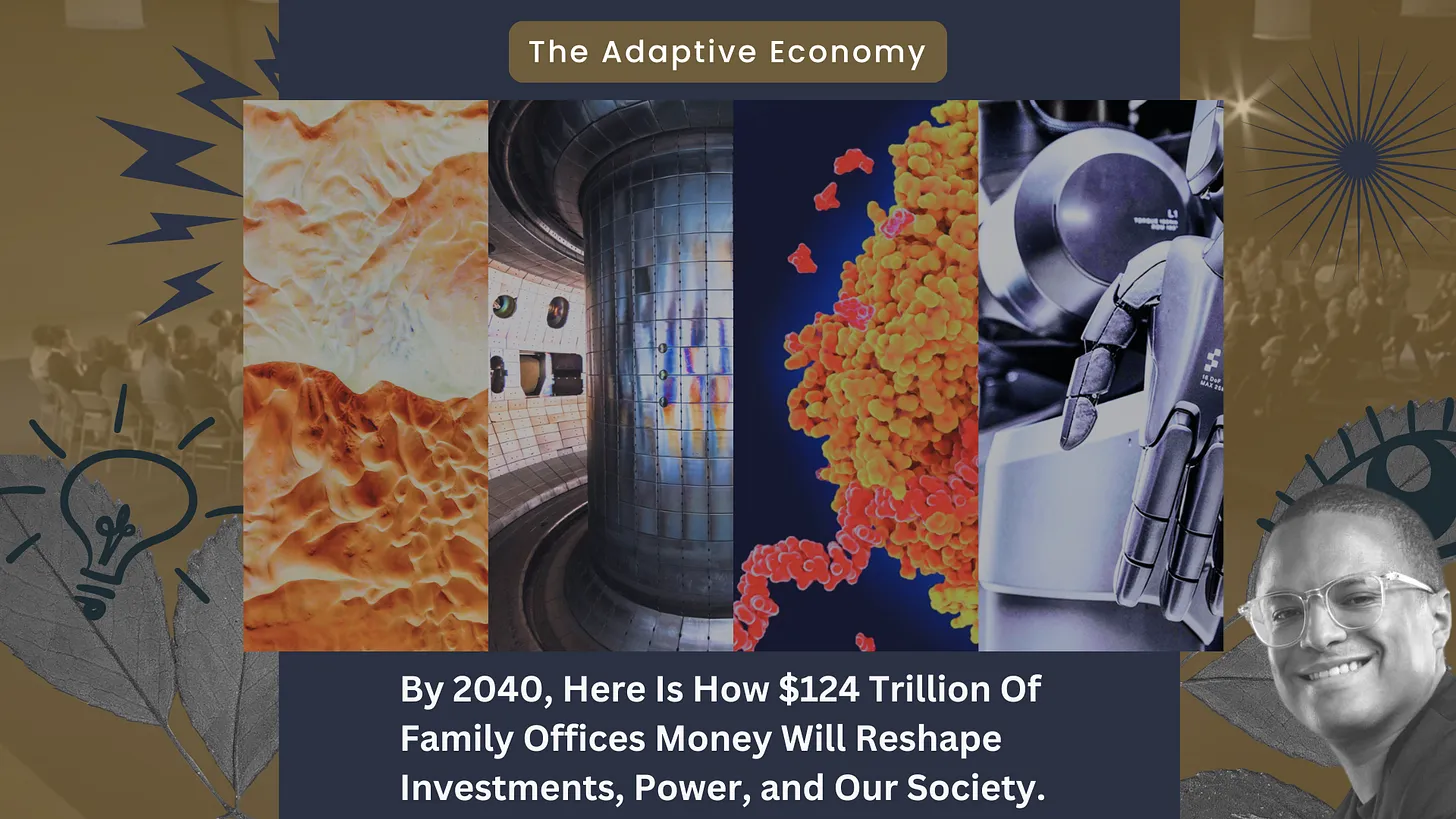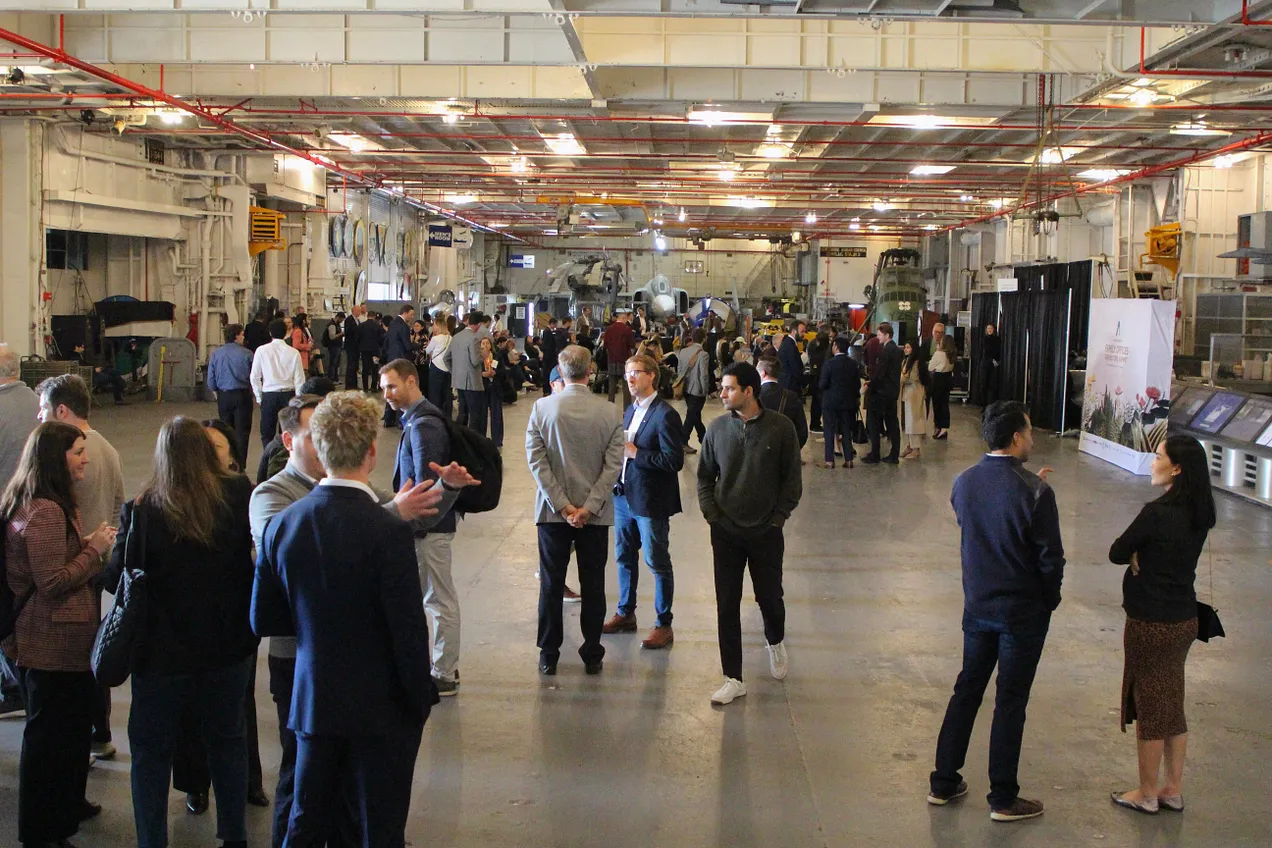A Message from Djoann Fal and the Atlas Coalition.
This is what happened a few weeks ago…
Aside of the fact that we definetly need to consider these family offices events more seriously rather than a fun hobby once in a while (✅ we’ve learned from your feedbacks and are going to cap the attendance at 200, 🥵 300 was too much, + ✅ hire another full time event logistic coordinator), here is what we’ve learned from this summit during New York Climate Week.
Part 1. Who is really in charge of our 🌏 planet? I say family offices.
Two weeks ago, during the height of the United Nations General Assembly (UNGA) in New York, we hosted the Atlas Family Offices & Investors summit. On one side of Manhattan, 15,000 government delegates gathered, focused on policy frameworks and diplomatic communiqués. On the other, tens of thousands of entrepreneurs and investors convened for Climate Week, where the focus was strictly on deployment, technology, and capital velocity.
The juxtaposition offers a stark, undeniable truth: while global governments deliberate, private capital is now the decisive actor in shaping the future of our environment and technological trajectory.
For decades, we relied on governments to set the pace—to mandate change through regulation or to fund innovation through subsidies. That model is obsolete. The scale and speed of the crises we face—climate change, geopolitical instability, and the exponential growth of technology like AI—demand an agility that bureaucracy simply cannot match. We are past the point where committees and political cycles can steer the ship. The power now resides where the capital is flowing, and how quickly it can be mobilised.
This shift defines our era, leading to a crucial punchline: “Every investment decision today counts more than a vote.”.
This is why the Family Office ecosystem commands our attention. We are not talking about institutional investment constrained by quarterly reports or public mandates. We are talking about genuine generational wealth being deployed strategically. Globally, there is an estimated network of 10,000 to 20,000 single family offices, overseeing a colossal scale of Assets Under Supervision (AUS). Our sources reveal that the average amount of assets supervised by these family offices globally is $864.6 million. Collectively, we introduce a sector controlling approximately $5.9 trillion in assets under management (AUM).
This sheer volume of wealth represents an unprecedented force. Family offices are generally the domain of families with significant assets; globally, the average total net worth of the families surveyed is $1.4 billion. Historically, family offices originated to handle complex financial and investment needs, dating back over 200 years. Today, many newer and smaller families are also adopting family office frameworks, indicating a rapidly growing and diversifying ecosystem.
But this scale is merely the foundation for the most critical factor: the largest generational movement of capital ever. The long-term investment mandate is often at the core of a family office’s investment philosophy. They embody patient capital, uniquely positioned to fund the deep infrastructure and high-risk frontier technologies required for planetary preservation and adaptation. The average portfolio already allocates a significant portion to alternatives, typically 45.72% globally, confirming their comfort with the illiquidity necessary for direct infrastructure and venture investments.
When we gather the architects of this capital—the principals, CIOs, and fund managers from houses like Rockefeller and the Eric Schmidt Family Offices Foundation—we are convening the world’s true decision-makers. They are the ones with the fiduciary duty to ensure success across generations, not just across fiscal years. This immense pool of wealth, coupled with a generational mandate for stewardship, means the capital flowing from family offices today is the primary force defining whether we build resilience or accelerate global breakdown.
The stakes could not be higher, and the time for half-measures has passed.
Part 2. The Great Wealth Transfer 💸
The engine powering this monumental shift in decision-making authority is the Great Wealth Transfer (GWT). This isn’t merely an administrative exercise; it is a profound societal re-ordering.
We are currently witnessing an estimated $84 trillion forecasted to be transferred in the United States alone, moving from the Silent Generation and Baby Boomers to younger Americans and charities between now and 2045. Globally, this generational shift defines a massive $124 trillion transfer to Generations Y and Z.
To grasp the magnitude of this movement, we must contrast it with prior economic transitions. The post-war rebuilding era saw a massive re-allocation of capital, as did the preceding industrial revolutions. But those transfers occurred in times of relative stability and predictable geopolitical order. The Great Wealth Transfer today is wholly unique, defined by triple pressures that intensify its urgency:
- Climate Urgency: We face rapidly accelerating environmental feedback loops that defy incremental policy solutions.
- AI & Robotics: Exponential technology growth is re-writing entire economies and infrastructure requirements, demanding immediate investment in foundational layers (e.g., energy, computing).
- Fragile Geopolitics: Global instability, war, and pockets of slowing economic growth persist, creating a complex and uncertain investment landscape.
This volatility naturally heightens the interest in establishing robust private capital structures. When navigating ever-changing markets, long-term investing remains at the core of the family office mandate. The average target return set by FOs globally is almost 11% (mean 10.8%), reflecting an imperative to take illiquidity risk in pursuit of long-term alpha.
In this environment, Family Offices are emerging as the new sovereigns. They possess structural advantages that centralised governments lack: they are inherently flexible, fast, and unconstrained by bureaucracy. Unlike public or even large corporate entities, family offices benefit from a high degree of customisation and control. They exist to provide coordinated oversight of vast assets and frequently streamline investment decisions, with almost half (48%) reporting that the family principal ultimately makes investment decisions. For those using an investment committee (30% globally), nearly all (94%) include at least one family member. This concentration of decision-making speeds deployment.
Crucially, nearly 70% of global respondents identify succession planning and preparing the rising generation as primary family office goals. This is where the Great Wealth Transfer gains its moral weight, demanding an answer to the critical question: “Will this wealth build resilience or accelerate collapse?”.
The younger generations inheriting this capital are already demonstrating a greater focus on non-financial legacy goals. U.S.-based family offices are already more focused on philanthropy and impact investing (51% of U.S. FOs cite this objective) compared to their international counterparts (30%). This inherent mandate for stewardship—often involving the preparation of the rising generation through education, involvement in philanthropy, and encouraging outside professional experience—forms the philosophical bedrock for the movement we are leading: Adaptation Capitalism. This capital must be used strategically to ensure the family’s success “both on and off the balance sheet”.
Part 3. Voices From the Summit🕴
The Atlas summit brings together family offices ranging in size, from those potentially managing $50 million to $500 million in assets under supervision (AUS) to the largest overseeing $1 billion or more in AUS. Despite these differences in scale and complexity (e.g., smaller offices outsource investment management more frequently, around 40%), they share a core focus on managing financial assets (noted by 96% globally). The discussions in New York underscored how this investment focus is rapidly converging on resilient, adaptive technology and infrastructure.
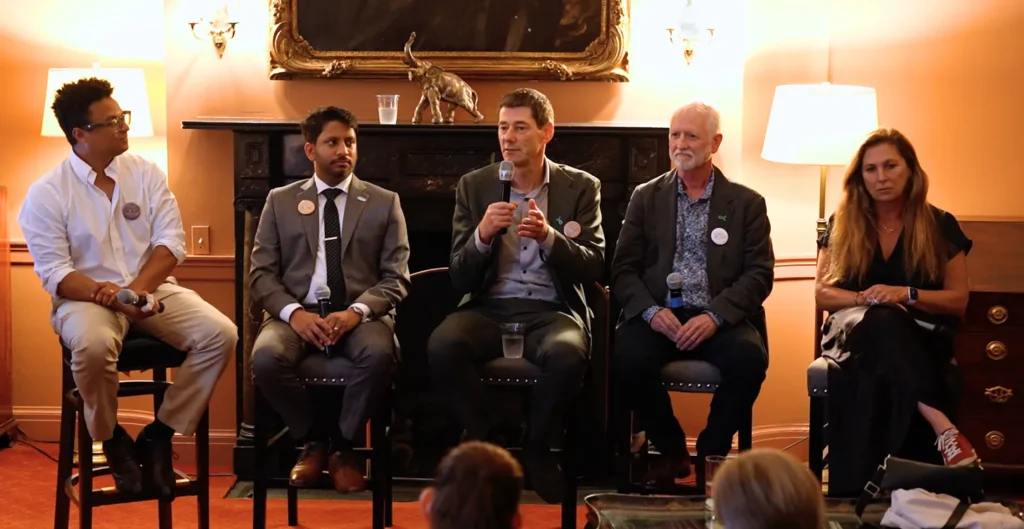
One of the most sought after discussion at our Family Offices summit was: LP & GP Discussion: Perspectives on Energy, AI & Adaptation Investment, moderated by Djoann Fal.
The insights gleaned from the leaders of these prominent capital sources illustrate that investment returns and planetary preservation are no longer mutually exclusive but deeply symbiotic.
Suzanne (Investments at Salesforce) on Foundation Layers
Suzanne emphasised that true, scalable returns in the new economy are found not merely in end-user applications, but in the ‘picks & shovels’ that underpin adaptation.
Watch Suzanne’s panel in video here
This means looking beyond glossy consumer products and focusing squarely on infrastructure, particularly in grid optimisation, software defined networks, and Distributed Energy Resource Management Systems (DERMS). These infrastructure layers, which increase efficiency, intelligence, and resilience, are where the outsized returns are created. This approach aligns perfectly with the long-term horizons characteristic of family office investment mandates. Investment in foundational assets like real estate (77% of FOs allocate to real estate) and private equity (86% of FOs allocate to private equity) already forms a substantial part of family office portfolios. Extending this mandate to green infrastructure and optimisation software represents a natural evolution for patient capital seeking stable, compounding returns.
Jim (Single Family Office) on AI & Storage
Jim distilled the investment opportunity into a concise equation: Energy storage + AI = biggest ROI lever.
He cited compelling data showing record storage installations coinciding with rapidly falling battery costs. This creates a powerful financial argument for investing in clean energy flexibility. As family offices continue to allocate robustly to alternatives—with larger offices typically holding the highest allocations—energy storage sits squarely at the nexus of technology and infrastructure, offering the potential for significant long-term growth consistent with the global average target return of nearly 11%. For family offices interested in gaining control or exerting direct influence over investments, infrastructure plays like storage offer ideal ground for direct investments, a core factor increasing interest in forming a family office in the first place.
James (Private Equity Investor) on Political Decoupling
James offered a powerful reminder that while governments talk, market forces act. He noted that one of the largest green infrastructure investments of the decade was implemented not necessarily due to President Biden’s Inflation Reduction Act (IRA), but under a prior administration’s mandate.
Watch James’s panel in video here
The implication is profound: investment often decouples from politics. Family offices, designed for speed and control, rarely wait for legislative clarity. They execute based on deep research (a top motivation for using external advisors is access to research, 65%) and the unshakeable long-term demands of reality. The strategic use of external advisors is commonplace, with almost 80% reporting using them globally. These advisors provide crucial capabilities like investment management (71%) and asset allocation advice (61%), enabling FOs to move swiftly regardless of the political climate.
Martijn (Leonardo DiCaprio’s Climate Fund Manager) on Exit Pathways
Martijn provided a critical perspective for founders and fund managers, focusing on liquidity: the AI boom is creating brand-new exit pathways for climate tech.
Learn more about Martjin in video here
The exponential rise of AI necessitates massive infrastructure deployment. This is leading to unprecedented demand for data centres, which, in turn, are becoming a significant catalyst for high-volume, reliable energy solutions. This new class of dedicated infrastructure buyers—Big Tech, hyperscalers, and corporations—is opening the exit bottleneck that has historically plagued deep climate technology. This trend validates the increasing professionalisation of family offices and their strategic mandate to pursue investment management and wealth advisory services.
Kyle (From Eric Schmidt Foundation) on Nuclear & Big Tech
The discussions also highlighted how traditional power structures are responding to this demand. Insights from the Eric Schmidt Family Office Foundation pointed to massive, paradigm-shifting deals: both Microsoft and Oracle are actively investing in nuclear energy to power their data centres. This commitment represents one of the largest green energy deals of the decade.
Watch Kyle’s panel in video here
The thread connecting all these voices is clear: capital markets, not politics, set the pace. Family offices inherently understand the long-term, non-cyclical nature of real asset deployment. Their average portfolio already reflects this long-term strategy, with major allocations to real estate (14.47% mean global allocation) and private equity (17.14% mean global allocation). They are uniquely suited to fund the multi-generational infrastructure plays like nuclear power required by the AI revolution, viewing them as essential to generational security and legacy.
Part 4. What This Means for GPs & Founders ⚙
The collective focus of the world’s leading family offices on adaptive technologies signals a major structural change in capital allocation. This change demands an immediate response and evolution from General Partners (GPs) and Founders seeking patient, sticky capital.
For GPs (Fund Managers)
The traditional Limited Partner (LP) narrative is insufficient. The LP story is shifting. Family offices are not merely seeking diversified exposure; they demand investments structured around infrastructure, AI integration, and core resilience.
Their expectations are driven by a long-term, dual mandate: achieving aggressive financial targets (average target return globally is nearly 11%) while safeguarding generational wealth and legacy.
The Case for Resilience-Focused Funds: To capture the attention of this capital base, GPs must position their funds around the essential adaptation themes discussed at the summit: next-generation grid resilience, advanced energy storage solutions, and catalytic, clean energy sources like nuclear. Funds must be engineered to speak the language of institutional resilience while offering the upside characteristic of innovative technology

LP-GPs networking in the former library of US president Coolidge during our Family Offices & Investors Summit, September 2025. Photo: Atlas Capital
How to Pitch Family Offices: Pitching family offices requires precision and resonance, focusing on three core pillars:
- Data: Family offices value diligence and research. Present sophisticated, quantifiable metrics. Ensure that performance is evaluated rigorously; 76% of FOs already use some form of benchmark to evaluate performance. Larger family offices often rely on customized benchmarks based on Strategic Asset Allocation (SAA).
- Returns: The focus must be on total returns, extending beyond mere financial upside to encompass resilience and climate security. Family offices are acutely aware of the necessity of taking illiquidity risk for greater long-term potential.
- Legacy: Connect the investment thesis directly to the family’s mission and intergenerational stewardship. Nearly 70% of family offices cite succession planning and preparing the rising generation as key objectives. Investment in adaptive technologies directly addresses their profound concern that wealth should not lead to complacency but enable personal achievement and preparedness for future responsibility. Funds that incorporate impact and legacy considerations resonate deeply, especially in the US, where impact investing and philanthropy are cited objectives by over half of family offices surveyed.
GPs must recognize that investment management is paramount to the family office. Demonstrating access to unique due diligence and robust manager platforms is paramount, as this is the most frequently cited motivation for working with external investment advisors (66%).
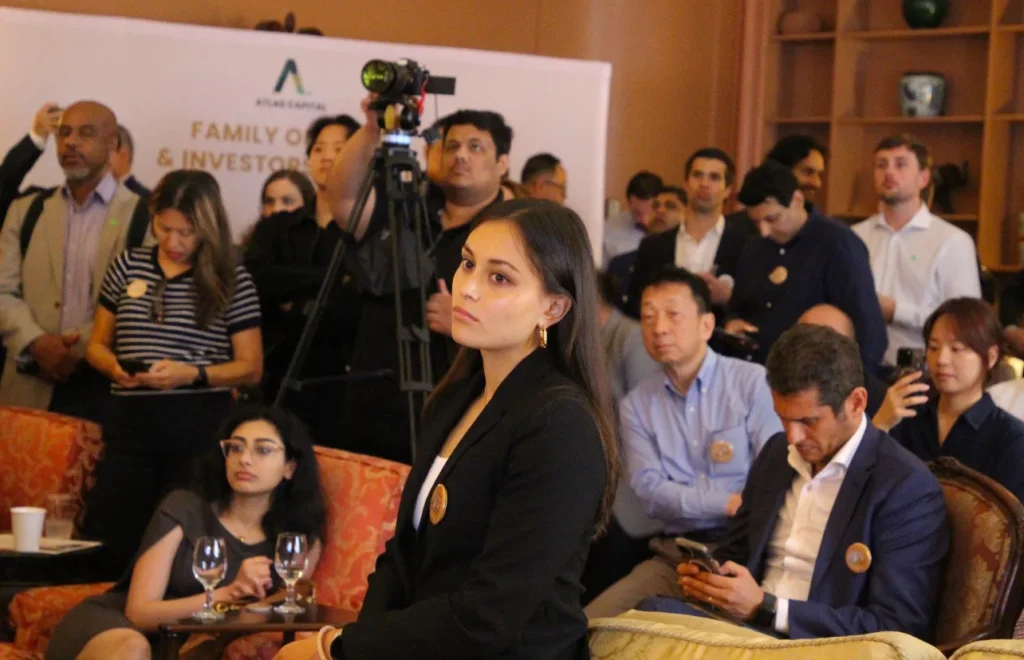
For Founders
The most significant shift for founders is the opening of the exit bottleneck.
Historically, scaling deep climate technology faced limited buyer pools. Now, the landscape is diversifying rapidly. Buyers are no longer limited primarily to public utilities; they now include Big Tech firms, major global corporations, and sophisticated, patient infrastructure investors like family offices.
The Adaptation Playbook: Founders must structure their business model and technology to meet the demands of these new buyer classes. The playbook requires designing solutions specifically for adaptability and infrastructure-readiness.
This means:
- Building software and hardware that is compatible with existing grid and operational frameworks (e.g., Salesforce’s focus on DERMS).
- Ensuring solutions can meet the intense, reliable power demands of AI and data centres (e.g., Microsoft and Oracle’s nuclear investments).
- Focusing on scalable systems that offer resilience, directly answering the family office’s focus on long-term portfolio fortification.
The Atlas Coalition’s fundamental role is bridging this FO capital with frontier founders. We facilitate the necessary dialogue that moves beyond traditional pitches to focus on multi-generational deployment strategies. Family offices often look to engage in direct investments when there is mindset alignment and a quest for better value and return. By structuring opportunities around the core pillars of resilience and adaptation, we ensure that cutting-edge technology secures the informed, patient capital it needs to scale globally.
Part 5. Beyond Capital – The Movement 🌊
The recent gathering in New York demonstrated that this is more than just a financial trend; it is the genesis of a global movement.
The Atlas Summit was structured not just as a forum for deal flow, but as a crucible for shared vision. The attendees represented the spectrum of influence: we hosted storied multi-generational wealth from families like Rockefeller and Bloomberg, alongside representatives from state capital structures like the Monaco sovereign family office, and new-economy dynastic wealth from the Walton family. Critically, they sat alongside the founders of unicorn companies—the technology architects themselves.
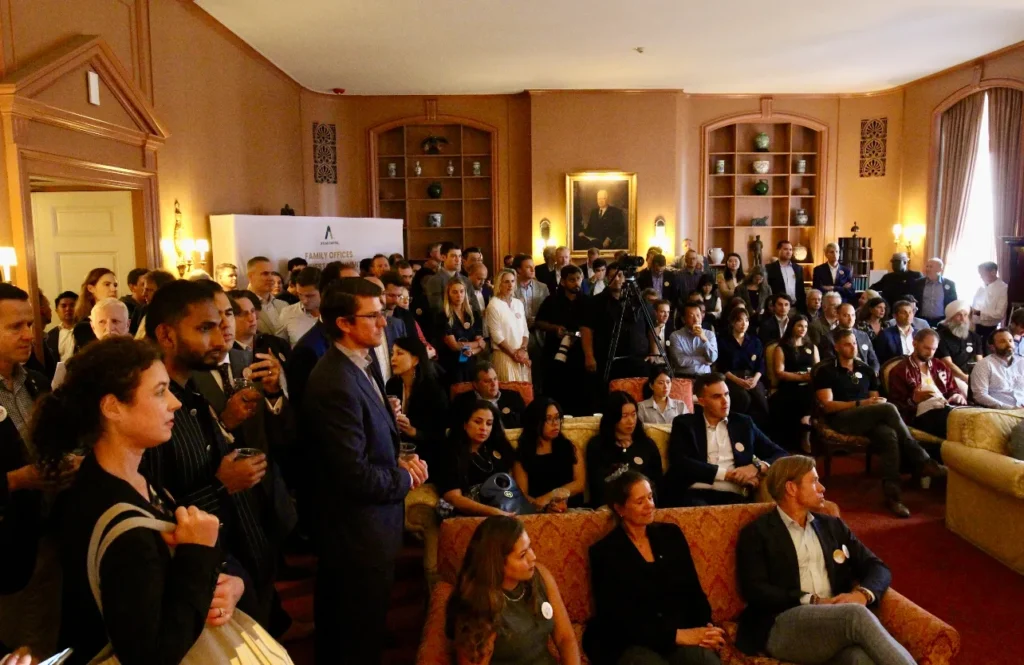
Full House for the opening words of Djoann and Cassandra. A few blocks away approximately at the same time, Trump was doing his speech at the UNGA…
The convergence signals a new era: “This isn’t just a summit. This is the dawn of Adaptation Capitalism.”.
Atlas as Coalition Builder: The Atlas Coalition acts as the critical network required to align this immense wealth. We represent 1,200 members with approximately $22 billion in AUM already in motion. Our mission is to transform scattered insights into collective leverage.
The need for this collective structure is highlighted by existing challenges within the family office ecosystem. While most family offices acknowledge the importance of complex issues like succession planning and governance (69% cite them as goals), they often lack a structured approach. Globally, the top three cited services gaps are in cybersecurity (40%), family governance and succession planning (31%), and family wealth education (31%). A significant portion (29% globally) admit they have no structured approach to preparing the rising generation. In the largest U.S. family offices ($1B+ AUS), this lack of structure is particularly pronounced, with 32% reporting no rising generation preparation measures.
This complexity and the identified gaps underscore why convening matters: networks are leverage. By bringing together families who are wrestling with identical issues—from the highest levels of formal governance (where large FOs oversee $1B+ AUS are most likely to employ boards of directors, 42%) down to the existential question of preparing the next generation—we create a peer-to-peer advisory ecosystem that policies cannot replace.
The Vibe in the Room: The atmosphere at the summit was defined by an acute sense of urgency coupled with relentless optimism. The urgency stems from the recognition that waiting for external policy is a catastrophic risk. The optimism is rooted in the overwhelming evidence that technological breakthroughs (like AI, energy storage, and nuclear innovation) are simultaneously presenting the highest financial return opportunities and the most viable pathways to resilience.
The collective confidence of this decisive capital signals a departure from purely regulatory-driven impact investing towards a highly focused, returns-first, adaptation-driven strategy. This shift mandates a new, clearer definition of the capital we are deploying.
Part 6. The Need For An Adaptation Capitalism 📖
To operate effectively within the current climate and technological paradigm, we must clearly define the philosophical framework guiding our capital deployment. We call this framework Adaptation Capitalism.
Defining Adaptation Capitalism: Adaptation Capitalism is specifically defined as capital aimed at resilience, adaptation, and regeneration. It embraces a mandate that acknowledges the unavoidable realities of climate change and geopolitical flux, demanding that every investment decision maximises system survival and future success.
This framework must be clearly contrasted with existing, often insufficient, models:
- Contrast with ESG: Environmental, Social, and Governance (ESG) investing, while foundational, is often criticised for being too shallow and compliance-driven. It frequently measures inputs or filters out negatives rather than actively forcing positive, scalable adaptation outcomes. Adaptation Capitalism invests in solutions because the world is already changing, recognising that resilience creates the highest long-term financial returns.
- Contrast with Philanthropy: Philanthropic efforts, while noble, are too slow to meet the exponential challenge of planetary preservation. Philanthropy is constrained by budgets and often targets systemic issues without the immediate mandate for scaled deployment and self-sustaining returns. While philanthropic services are offered by over 80% of family offices globally—and are particularly focused on in the U.S. (51% of U.S. FOs cite it as an objective)—this capital pool cannot compete with the velocity and scale of returns-driven investment. Investment capital, when directed toward adaptation, can deploy billions quickly because success is tied directly to superior risk-adjusted returns.
Adaptation Capitalism channels the long-term, high-risk tolerance of family offices directly into high-impact, technologically superior solutions that redefine foundational infrastructure.
Examples of Adaptation Capital in Action: The summit highlighted practical applications for this capital strategy:
- Decarbonisation Technology: Investing in the core technologies required to draw down emissions and replace carbon-intensive systems at scale.
- Bio-adaptive Materials: Funding the next generation of building, manufacturing, and agricultural resources designed for a high-variability climate.
- Nuclear for AI Grids: Catalysing the development and deployment of reliable, non-intermittent power sources (like nuclear) that can meet the massive, immediate energy requirements of the Artificial Intelligence revolution. This is a clear example of convergence where urgent technological demand meets the need for reliable, adaptive energy infrastructure.
This intense, targeted investment is fundamentally restructuring the market, absorbing risk, driving technological maturity, and building resilient systems across the globe. We are witnessing a monumental restructuring, leading to the inescapable conclusion that this movement represents nothing less than the 3rd Industrial Revolution in motion. For family offices, navigating this complex landscape successfully is crucial to fulfilling their most basic role: planning for the future of the family and the shared family enterprise.
Part 7. Conclusion & Call to Action ✌️
The Atlas summit in New York confirmed the uncomfortable truth of our century: “Capital now carries more weight than votes.”.
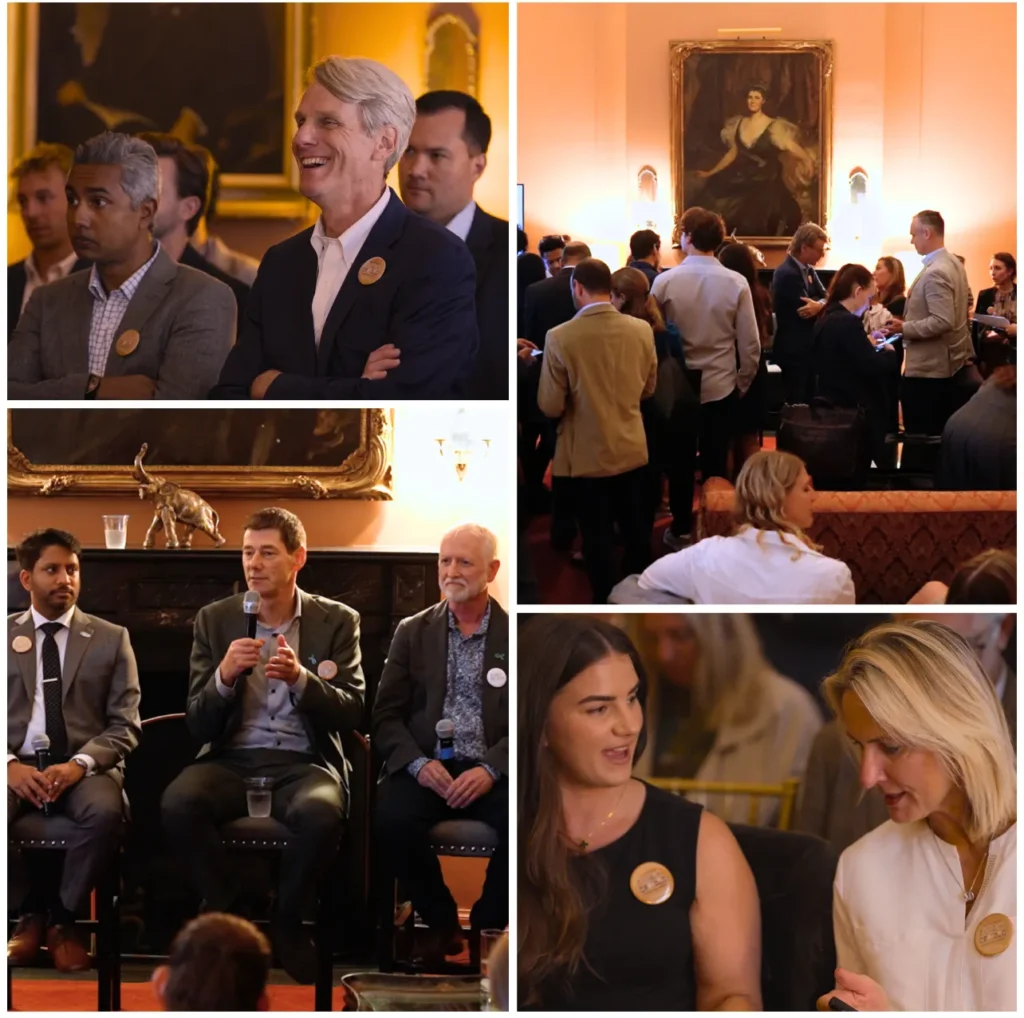
Experience our summits yourself: pre-register for the upcoming family offices & investors summit in San Francisco and New York https://atlascoalition.com/upcoming-events/
In the absence of unified global governance and rapid policy execution, the decisions made by the world’s most powerful pools of private wealth—the $5.9 trillion controlled by family offices—will determine whether humanity adapts or suffers unnecessary collapse.
But this truth is not a lament; it is our opportunity..
We are no longer waiting for governmental subsidies or anticipating another generational Industrial Revolution, nor should we. Family offices, informed by their generational mandate, are emerging as the decisive force for planetary preservation and technological adaptation.
This power derives from three core strengths inherent to family office structures:
- A Growing Source of Catalytic Capital: Family offices move capital with a speed and flexibility that governments cannot match. Unlike large institutions, they are structured to simplify complex balance sheets, enable efficient oversight, and allow principals to make quick, critical investment decisions (48% globally have the principal making the call). They are deploying billions, unconstrained by bureaucratic inertia.
- Informed and Patient Money: Long-term investing is central to the family office mandate. They possess long time horizons and an intergenerational focus on stewardship. Their high allocation to private alternatives (45.72% mean globally) is evidence of their readiness to shoulder illiquidity risk for foundational adaptation plays.
- Redefining the Very Meaning of Total Returns: The modern family office pursues returns that encompass more than mere financial upside; they value resilience, climate security, and the survival of future generations. This commitment is rooted in their core objective of ensuring long-term family success and legacy.
The Great Wealth Transfer—the largest movement of private capital in history—can be tragically squandered through inaction or conservative compliance strategies. Or, it can become the greatest act of adaptation in human history. The choice is ours.
We invite you—the principals, CIOs, and visionary fund managers—to join the Atlas Coalition. Let us continue to transform dialogue into deployment and insight into action. We will be holding our subsequent Adaptation Capitalism Summits globally, including upcoming gatherings in Abu Dhabi, Miami, and San Francisco.
We are not merely spectators watching history unfold; by strategically directing this immense wealth, we are actively writing it.
Join us for our next upcoming summits.
The future of our planet is an investment decision.

